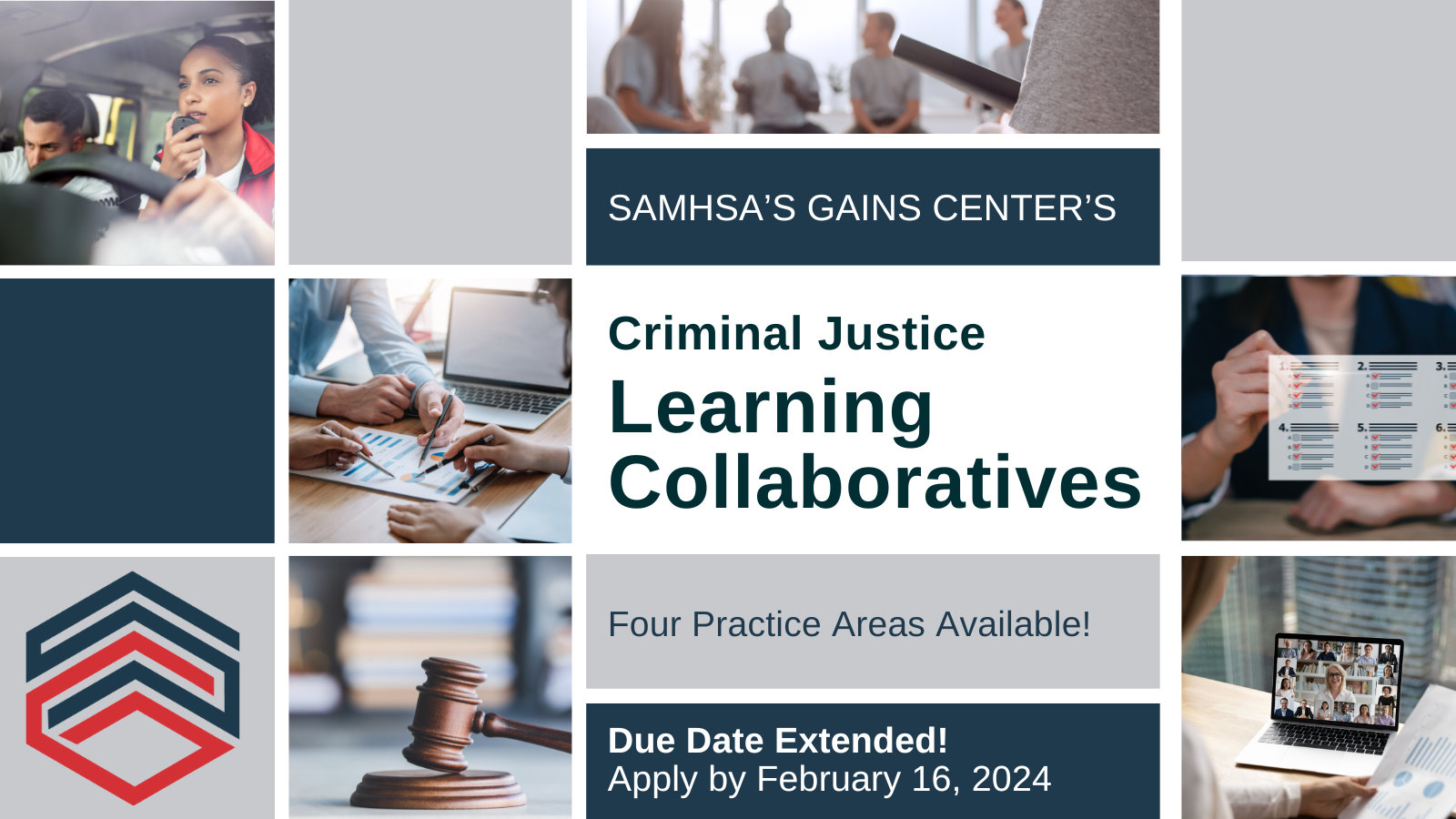SAMHSA’s GAINS Center for Behavioral Health and Justice Transformation, operated by Policy Research Associates, Inc., is continuing to provide direct training and technical assistance to jurisdictions across the nation to better support people with behavioral health needs who are involved in the criminal justice system. The GAINS Center is soliciting applications from jurisdictions interested in collaborating with subject-matter experts through Criminal Justice Learning Collaboratives (LCs) designed to explore four topics:
- Creating and Enhancing Community-Level Partnerships Among First Responders and Certified Community Behavioral Health Clinics
- Diversion and Support for Transition-Age Youth
- Implementing Risk-Need-Responsivity Principles in Adult Drug Courts and Reentry Programs
- Trauma-Informed Treatment Courts
For updates on future opportunities, join the GAINS Center mailing list.
About the Criminal Justice LCs
The LC model brings together local jurisdiction teams to create coordinated local strategic plans and implementation strategies for the topic of focus. Selected teams for each LC will work intensively to determine optimal ways to implement best practices and define success indicators. Each topic-specific LC will engage subject-matter experts to work with jurisdiction teams during the implementation process and to facilitate peer-to-peer sharing. Through a virtual platform, selected teams will work together to learn and complete their implementation work while, at the same time, have the opportunity to share with other jurisdictions and receive an array of technical assistance from subject-matter experts across the country.
NOTE: All 2024 LC events are planned to be delivered virtually.
The LCs are designed to achieve four key objectives:
- Enhance collective knowledge of key issues and familiarity with the topic.
- Understand promising and evidence-based practices to address related issues.
- Develop strategic plans that focus on addressing the issue, with a focus on the implementation of policies, procedures, and best practices to improve treatment, services, and supports.
- Increase knowledge about challenges and lessons learned in implementing strategies through peer-to-peer sharing.
Application and Selection Process
-
- Applications for these solicitations are due February 16, 2024
- General requirements:
- Narrative (up to five pages)
- Expectations/guidelines will differ by LC topic
- List of key stakeholders who will participate in the team
- Letters of support or commitment from key partners
- Selected jurisdictions will be notified by February 26, 2024
Tracey Ginn, MS, LCMHC, CPM, Interim Assistant Director for Hospitals, Division of State-Operated Healthcare Facilities, Psychiatric Hospital Team, North Carolina Department of Health and Human Services: 2022 Competence to Stand Trial/Competency Restoration LC
“The knowledge shared across sessions was incredible. There were a few presenters that I feel like I could listen to for hours on end and continue to learn from their expertise and experience. We received great feedback and guidance from all the technical assistance providers, and their ability to connect us or refer us to even more experts or examples to help us with our needs was a huge gain for us. One of the most helpful parts of the LC was the ability to schedule follow-up one-on-one sessions with some of the experts and really address our site-specific questions/issues.”
FY2024 LCs
Creating and Enhancing Community-Level Partnerships among First Responders and Certified Community Behavioral Health Clinics (CCBHCs) LC
The Creating and Enhancing Community-Level Partnerships among First Responders and Certified Community Behavioral Health Clinics (CCBHCs) LC will focus on establishing and strengthening partnerships among law enforcement and other first responder entities and CCBHCs at the local level, with a focus on providing first law enforcement-friendly options for addressing the acute needs of people who are in mental health crises. A main focus of the LC will be on developing direct connections with CCBHC-provided crisis mental health services, including 24-hour mobile crisis teams, emergency crisis intervention, and crisis stabilization.
Diversion and Support for Transition-Age Youth
The Transition-Age Youth (TAY) LC will feature innovative diversion programs and implementation strategies at Intercepts 0 and 1 that support transition-age youth (16-25) who become involved with the criminal justice system. This LC will incorporate a comprehensive exploration of the cultural, familial, and community contexts that influence TAY who come in contact with the criminal justice system. Additionally, this LC will provide models of specialized support and diversion options responsive to the developmental stage and the broader social and systemic factors contributing to this population’s criminal justice involvement.
Implementing Risk-Need-Responsivity Principles in Adult Drug Courts and Reentry Programs
Risk-Need-Responsivity (RNR) principles have applications that help criminal justice programs support individuals with behavioral health disorders across the sequential intercepts, including adult drug courts and adult reentry programs. This LC will offer information on how to incorporate RNR principles and use RNR tools in drug court and reentry programming. Subject matter experts will work with selected teams to learn how to apply RNR principles and tools in addressing the criminal justice, behavioral health, and criminogenic needs of individuals in order to improve client outcomes. As a core feature of the LC, participating teams will learn how to make program-level modifications and improvements using RNR principles and tools.
Trauma-Informed Treatment Courts
The primary goal of the Trauma-Informed Treatment Drug Courts LC is for teams to develop strategic plans to advance policies and practices on trauma-informed treatment drug court programs. This LC will bring together local jurisdiction teams to create coordinated local strategic plans and implementation strategies for integrating the principles of trauma-informed systems and associated practices into the everyday processes of their treatment drug court(s). The teams selected for this LC will work locally and collaboratively to examine their court-specific policies and practices and identify policies and practices that need to be revised to be trauma-informed. Through this LC, participating treatment drug court teams will work together to learn and complete their implementation work, while at the same time, have the opportunity to share with other jurisdictions and receive an array of technical assistance from subject matter experts across the country.
Frequently Asked Questions
To learn more about this opportunity and to gain insight into preparing a strong LC application, please download the Frequently Asked Questions document.


